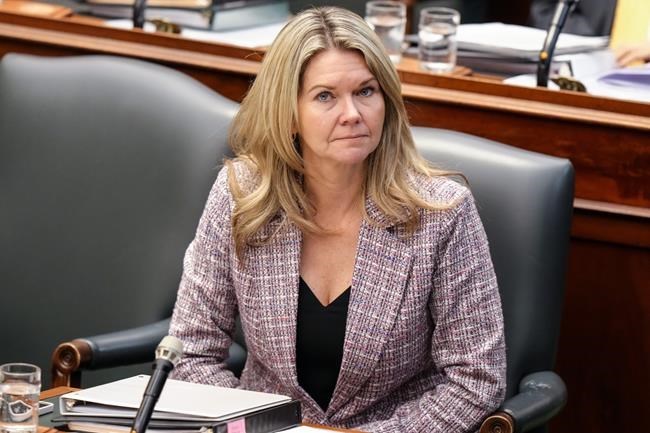TORONTO — Ontario is putting an additional $1.3 billion over three years toward post-secondary institutions increasingly struggling with finances in the face of low provincial funding and frozen tuition fees, but colleges and universities said it does not come close to sustaining the sector.
The funding announced Monday by Colleges and Universities Minister Jill Dunlop is less than half of what was recommended by an expert panel she tapped to examine post-secondary finances. She also announced a continuation of a tuition fee freeze will continue until at least 2026-27, except for allowing institutions to boost tuition by five per cent for students from other provinces.
"This is a broad range of measures that will offer much needed stability to the post-secondary sector and help keep costs down for students and their families," Dunlop said at a news conference.
"Ultimately our goal is to put students and their needs first."
The expert panel recommended a one-time, 10-per-cent increase in per-student funding to colleges and universities followed by inflationary increases in subsequent years, as well as a five-per-cent increase in tuition along with an "equally generous" increase to student aid.
Full implementation of the expert recommendations would have meant $2.5 billion in ongoing base funding over the next three years, said Council of Ontario Universities president Steve Orsini.
"Today’s announcement, while providing short-term relief, falls far short of what the government’s own expert panel found was urgently required," he said in a statement.
Dunlop said the $1.3 billion stands as the government's response to the recommendations, and that includes $15 million for third-party reviews to identify "structural issues" and find "long-term cost savings."
"This is a shared responsibility," she said.
But the gap between what's needed and what has been offered is "far too large to close through efficiencies alone," Orsini wrote.
Both Orsini and the president and CEO of Colleges Ontario said the money is welcome, but more needs to be done.
“While the investment announced today is a welcome first step, we expect further action from the province," Marketa Evans said in a statement. “The future of the high-quality programs offered to students remains at risk."
Dunlop pivoted often in her press conference to heaping blame on the federal government for causing "disruption" in the post-secondary sector with its announcement that the number of visas for international undergraduate students will be slashed. Ontario will see its allotment cut in half.
But the government-commissioned expert panel and Ontario's auditor general have noted that low levels of provincial support over several years combined with a 2019 tuition fee cut and freeze are a large part of the reason institutions have turned increasingly to international student tuition fees – which are much higher than what domestic students pay – to stay afloat.
Ontario ranks 10th out of 10 in every comparison of interprovincial post-secondary financing, according to a report last year by Higher Education Strategy Associates. International students now give more money to Ontario's institutions than the government does, the report said.
Raising Ontario's level of per-student funding to the average of the other nine provinces would require $7.1 billion per year in additional spending — much higher than the current level of operating funding at around $5 billion, author Alex Usher reported.
"Altogether, between inflation and the loss of international students, the sector was in for a hit of over $2 billion this year," Usher said Monday in response to Dunlop's announcement.
"This package maybe covers 20 per cent of that. It is not a serious attempt to put Ontario's colleges and universities on solid footing. It is, rather, the act of a government that prefers the appearance of solving problems to actually solving them."
The bulk of the new money will be in a three-year, $903-million Postsecondary Education Sustainability Fund, including $203 million for schools with the greatest need.
Other initiatives include more than $167 million going to capital repairs and equipment, $100 million this year put toward STEM programs at colleges and universities with more students than they are currently funded for, $65 million for research and innovation, $23 million for mental-health supports and $15 million for audits to identify "long-term cost savings."
As well, Dunlop said the province will allow colleges to offer applied masters degrees "in areas of study that will help students graduate with in-demand skills, expertise and credentials" such as in advanced manufacturing, artificial intelligence and animation.
Dunlop also introduced legislation that would require colleges and universities to give students information about ancillary fees and other costs such as textbooks, and the bill would require institutions to have mental-health and wellness supports policies in place.
NDP critic Peggy Sattler said her party supports a continued tuition fee freeze, but it needs to come with greater government support.
"We know that in Ontario, government funding represents just 30 per cent of the revenues that colleges and universities get," she said.
"That's far lower than in any other province. Ontario will still be dead last across Canada, in terms of the level of per-student funding that our colleges and universities receive ... From the minister's announcement today, it is clear that this Conservative government does not in any way understand the severity of the crisis that our post-secondary institutions are facing."
This report by The Canadian Press was first published Feb 26, 2024.
Allison Jones and Liam Casey, The Canadian Press



